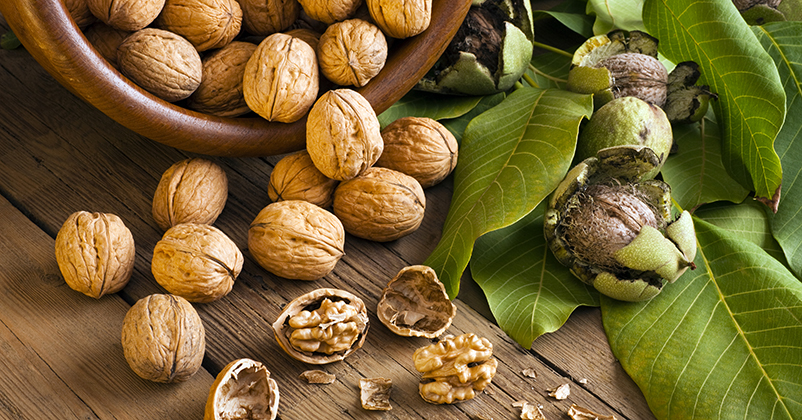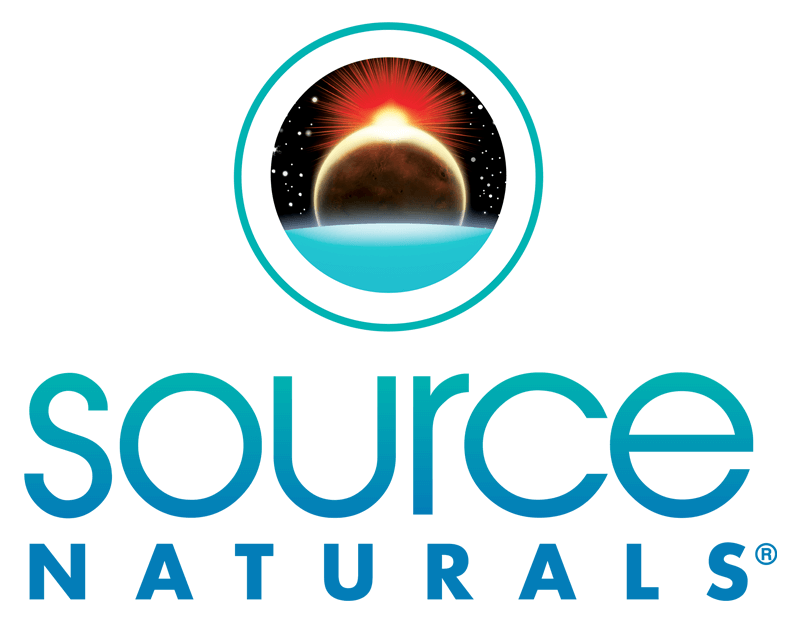
Most people think crunchy, toasty walnuts are just nutty good. But did you know that they’re a delicious way to get essential nutrients and healthy fats into your diet? Walnuts are an excellent source of essential omega-3 fatty acids, with more antioxidants than most other foods. So a walnut habit can be a healthy habit, too.
OMEGA-3s
With nuts, it’s all about healthy fats and nutrient density.
Fats can be good; what matters is what kind of fat you eat. Your body needs fat to support important biochemical functions, and some nutrients need to be dissolved in fat so your body can use them. The key is choosing potentially helpful (“good”) fats and using them in moderation—because even good fats are still high in calories.
Nutrient density is where walnuts really shine. Most nuts contain monounsaturated fats—a type of “good” fat that’s healthiest for daily use—but only walnuts contain primarily polyunsaturated fats, the essential fats found mostly in plants. Walnuts are one of the best plant sources of polyunsaturated omega-3 essential fatty acids, with the highest amount of alpha-linolenic acid (ALA) of any nut. “Essential” means that you have to obtain these nutrients from your diet, because your body can’t synthesize them. Omega-3s are a vital component of the outer membranes of brain cells, which enable the transmission of nerve signals—and ultimately make thought, learning, and memory possible.
CHOLESTEROL REDUCER
Emerging evidence suggests that a diet rich in the polyunsaturated fats in walnuts may help reduce levels of "bad" low-density lipoprotein (LDL) cholesterol and improve general heart health, especially for older adults. Research shows that cholesterol-lowering diets including nuts can reduce “bad” LDL cholesterol by 9-20%, regardless of the amount of fat or nuts. Almonds are considered good, too—but ounce-for-ounce, walnuts are more effective.
TOP NUT FOR YOUR HEART
In fact, researchers are saying that the walnut may be the “top nut for heart health.” They’re finding that walnuts have more—and better quality—antioxidants than other popular nuts, and antioxidants play a key role in reducing damaging inflammation. Instead of the alpha-tocopherol form (the form that’s measured with a Daily Value), walnuts provide an unusually high level of vitamin E as gamma-tocopherol. gamma-Tocopherol is important for normal hemoglobin, the protein that carries oxygen in the blood. In studies on men’s cardiovascular health, gamma-tocopherol has been found to provide significant protection from heart issues.
SUPPORT FOR WEIGHT LOSS AND MORE
Walnuts also have a positive research track record in supporting weight loss and obesity prevention; obesity has been clearly identified by researchers as involving chronic, unwanted inflammation, and walnuts offer a powerful collection of anti-inflammatory nutrients.
More key nutrients in walnuts:
- Folate, which reduces the risk of central nervous system defects in unborn babies
- Magnesium, which supports healthy bones and muscles (including the heart)
- Phosphorus, which is important for cell growth and releasing the potential energy contained in the foods you eat
- Copper, which supports healthy connective tissues, bones, and cognitive function
- Manganese, which helps prevent osteoporosis (in combination with calcium and copper)
- Iron, which is an essential mineral and component of hemoglobin, the substance in red blood cells that transports oxygen throughout the body
- Zinc, which is a co-factor in many enzymes that regulate growth, development, and digestion
SO, EAT MORE WALNUTS
Just one serving of walnuts provides health benefits. That’s 1 ounce: about 7 whole walnuts, or 14 halves.
Nutrient-dense foods like walnuts make excellent snacks because they’re not empty calories: Their healthy fats, protein, and fiber are serious nutrients that help you feel satisfied. Studies have shown that people who add a handful or so of nuts to their daily diet actually maintain or lose weight when their overall calories remain balanced.
The health benefits of whole walnuts extend to walnut oil, too: Choose oil that’s unrefined, use it within 6 months of opening, and enjoy it either uncooked or cooked at low temperatures.
It’s easy to get more nutty goodness into your day:
- Sprinkle chopped walnuts over your favorite foods, from yogurt and salads to desserts.
- Make walnut butter: Put toasted walnuts into a food processor and blend until smooth; add honey or cinnamon, if you like. It’s delicious as a dip for veggies or a schmear on sliced fruit.
- Skip the breadcrumbs: Use fine-chopped walnuts to coat fish or poultry.
- Make pesto with walnuts, basil, olive oil, and garlic for pasta, sandwiches, or flatbread.
- Add walnut meal to batter-based recipes for a richer, nuttier flavor. The nuts add a thick texture that works beautifully in pancakes and desserts.
- Try walnut flour as a low-carb, cholesterol-free, high-antioxidant option if you’re avoiding wheat flour or following a paleo or gluten-free regimen.
- Walnut oil has a rich, nutty flavor that’s perfect for adding to salad dressings, brushing on fish and steaks before serving, tossing with pasta, and jazzing up desserts, especially if you’re using walnuts as another ingredient in the dish. Be sure to choose unrefined walnut oil to get all the nutritional benefits.
Walnuts are perishable and can turn rancid with heat or age. If you’re using your walnuts right away, refrigerate them in an airtight container (or their original package). If you’ve stocked up for later (a month or longer), store them in an airtight container in your freezer.
IF YOU LIKE TO COOK
- Find tasty Mediterranean-themed recipes at Oldways, a nonprofit that’s inspiring healthy eating through cultural food traditions.
- Browse the recipes at the California Walnut Board.
References
Atli Arnarson PhD, “Walnuts 101: Nutrition Facts and Health Benefits,” AuthorityNutrition.com (accessed Aug. 9, 2016).
California Walnut Board, Walnuts.org (accessed Aug. 4, 2016).
Christopher Hobbs and Elson Haas, “Saturated, Monounsaturated, and Polyunsaturated Fats: What’s the Difference?” VitaminsForDummies.com (accessed Aug. 10, 2016).
Gianna Rose, “Walnut Oil Health Benefits,” Livestrong.com, Nov. 3, 2015.
Good Fats 101™, “Fats 101,” GoodFats101.com (accessed Aug. 10, 2016).
Harvard Family Health Guide, “They’re good for us, but which nut is best?” September, 2005.
Kathleen Doheny, “Walnut may be top nut for heart health,” WebMD.com, Mar. 28, 2011.
Laura Niedziocha, “Calcium, Magnesium, and Phosphorus Health Benefits,” Livestrong.com, Jan. 28, 2015.
Linda Posch MS SLP ND, “Health Benefits of Walnut Oils,” WhatsCookingAmerica.com (accessed Aug. 9, 2016).
Mark Cowen, “The Cholesterol-Reducing Health Benefits of Walnuts and Walnut Oil,” MedicalNewsToday.com, Jun. 8, 2016.
Megan Ware RDN LD, “What are the health benefits of walnuts?” MedicalNewsToday.com, May 5, 2016.
Nutrition-and-you.com, “Walnuts Nutrition Facts” (accessed Aug. 4, 2016).
Nuts.com, “Paleo Diet” (accessed Aug. 9, 2016).
Stephanie Watson, “What You Need to Know About Iron Supplements,” WebMD.com, Jul. 12, 2011.
The Cook’s Thesaurus, “Nut Flours & Meals,” FoodSubs.com (accessed Aug. 9, 2016).
The Nutrition Source, “Fats and Cholesterol,” Harvard University TH Chan School of Public Health (accessed Aug. 10, 2016).
The World’s Healthiest Foods, “Walnuts” (accessed Aug. 3, 2016).









